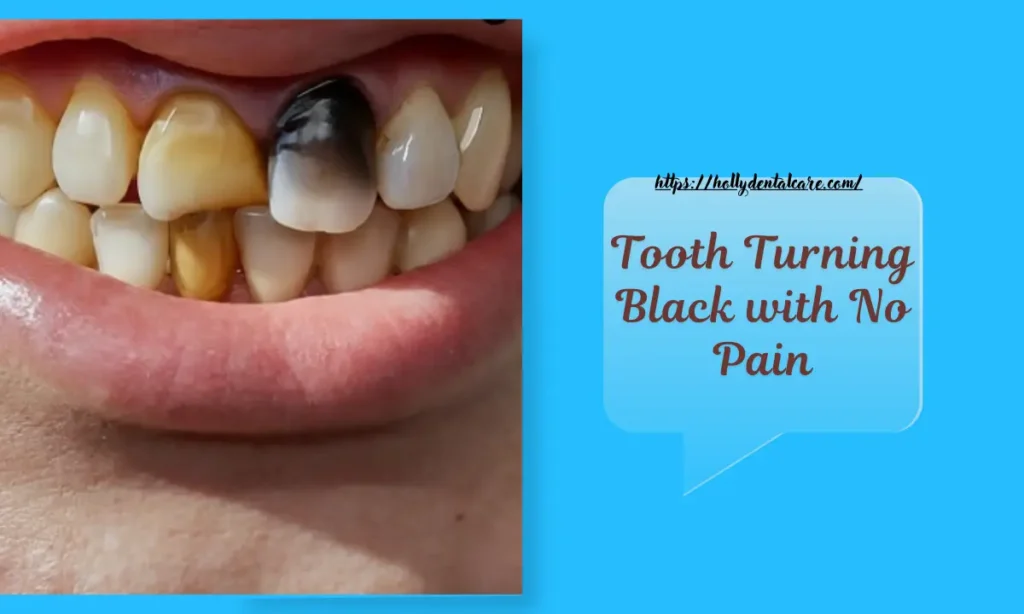There can be numerous external and internal reasons for a “Tooth Turning Black With No Pain” being felt. Outside reasons might be things like marks from smoking or eating and drinking dark stuff like coffee, tea, or red wine a lot. Inside reasons are often worse and may be due to harm, dead nerve tissue, deep tooth rot, or a hidden sickness. At times, the change in color is just about looks and not harmful, but other times, it could mean a real tooth issue that needs to be looked at by a dentist.
Supposedly, it doesn’t bring the patient immediate discomfort, in which case many tend to ignore it. Delaying treatment most often allows more deterioration of the condition so that only longer and more expensive treatments may be required later on. This is quite enough reason to recognize the disorder early and intervene immediately.
Tooth Turning Black with No Pain – An Overview
Having a tooth turning black with no pain produces anxiety, especially in the presence of no other leading symptoms. A majority of people associate dental problems with pain, but no pain does not necessarily mean everything is fine. In reality, a black tooth can often silently signify that something else is amiss, requiring urgent attention by a dental professional.
There can be many causes, such as inside staining from internal tooth decay, trauma resulting in nerve death, pulp necrosis (death of the nerve inside the tooth), or staining from long-term exposure to substances such as tobacco, coffee, or some drugs. At times, tartar buildup can also darken the tooth, or even past dental procedures may have caused the darkening. So, a black tooth with no pain must be seen as a clear warning, not just a small look problem.
Causes of a Tooth Turning Black Without Pain
Turning black and painless-your body might be trying to send you a warning. Discoloration from blackening may be produced from internal or external elements; in fact, there may not even be pain first. The following are some of the most common reasons:
Tooth Decay (Cavities in Advanced Stages)
Tooth decay does not necessarily herald pain. In the beginning, one will have no sensations. Bacteria eat onto enamel-layered teeth, meanwhile, the wearer feels no pain. It is at this stage, when layers deepen into the dentin or pulp, that the tooth looks brown or black. Untreated, decay would lead to staining.
When it becomes too late for treatment because the tooth is dead, hence the loss of sensation, it may appear there is no issue. This could also imply that even now, the decaying character is winning, albeit silently.
Dead Tooth
When a tooth gets hurt or rots badly, the soft inside, known as pulp, can die. This is called pulp necrosis. As the pulp dies, it stops the blood and makes the tooth go dark. This tooth, now lifeless, is often called a dead tooth.
At times with pain and sometimes not, a dead tooth can bring infections, abscesses, or even bone loss.
Trauma or Injury
This might make the tooth go grey, brown, or black over time. You might not feel pain right away, mainly if the hit was a while back, but the tooth could start to change color slowly as time goes on.
Staining
Some foods, drinks, and bad habits such as smoking can make teeth look dark. These marks may show up as brown or yellow but may get black if the teeth are not kept clean.
- On top stains: Dark spots from drinks like coffee or tea, or smoking.
- Deep stains: These change the tooth color from the inside, maybe because of meds, hurt, or growth problems.
These marks don’t hurt, but they still can be a problem for both looks and health.
Tartar Build-Up
When plaque isn’t washed off well, it turns into tartar. As time goes by, tartar can get a dark look, mostly close to the gums. Tartar does not hurt by itself, but it can lead to gum disease and tooth harm.
Signs That a Black Tooth Is a Problem
Just because you feel fine doesn’t mean it’s not bad. Here are some other bad signs for a black tooth:
- Bad breath that stays around.
- Bad taste in your mouth.
- Swelling in the gums next to the dark tooth.
- Gums pulling back or getting swollen around the spot.
- The tooth is getting loose.
- Dark line by the gum (might be rot or hard build-up).
What Will a Dentist Do If You Have a Black Tooth?
Eye Check
The dentist will check your tooth and the gum near it. They will look at the top, search for cracks, any decay, or gum problems, and ask about your past teeth care.
X-rays
Dental X-rays help assess:
- The extent of decay
- The condition of the pulp and root
- Presence of an abscess or infection
- Bone health around the tooth
Vitality Testing
This test determines if the tooth is still alive. Cold tests or electric pulp tests may be used to see how the nerve responds. A non-responsive tooth could mean the pulp is dead.
Treat a Black Tooth that Does Not Hurt
After your dentist figures out why it happened, they will tell you what to do next. Let’s look at what you might need, based on what they find:
Teeth Cleaning
If the tooth is only dark on the outside, a good teeth cleaning can take off tartar and stains on top. Polishing and scaling will get the tooth to look like it used to, if the outside is all that is hurt.
Fillings or Crowns (Due to Rot)
If rot is there but the tooth is still alive, you might get a filling to fix it. If the rot has gone far, a crown could be put on after taking out the bad part.
Root Canal Fix (If Tooth is Dead or Bad)
If the tooth is gone (dead), a root canal is the most used fix. This work means taking out the dead middle, making it clean, and closing it up. After, they often top it off with a crown for safety and looks.
Teeth fixed with a root canal may still look dark, in which case, making them white from inside or putting on a crown could make them look good.
Tooth Extraction
- Dental implants
- Bridges
- Partial dentures
Make-Up Fixes
If the tooth looks dark inside yet is sound, simple fixes like caps or inside whitening might help it look better.
Conclusion
You might want to skip worrying about a Tooth Turning Black With No Pain, but keep in mind that pain isn’t the only hint of trouble in your mouth. Big worries like dead teeth, germs, or bad decay can start without any hurt.
Finding and fixing it fast is key to keep the tooth, stop more bad things, and keep your teeth health good. If you spot any black spots or a tooth going dark, don’t wait for pain to start—call your dentist quick to deal with it before it gets worse.
Also read:- How Does a Single Tooth Denture Stay In? A Complete Guide to Retention Methods



